It seems like everyone is talking about the ketogenic (“keto”) diet these days.
Documentaries like The Magic Pill claim it may be able to cure autoimmune conditions, help in preventing and managing diabetes, and maybe even mitigate cancer.
There are tens of thousands of success stories from around the internet. Most people use keto/low-carb for weight loss, but others are using it to fight chronic inflammation, diabetes, seizures, and even more severe diseases that would normally require potentially harmful prescription drugs.
Naturally, it begs the question…
Can the ketogenic diet help with acne?
Before we get started, let me say this – there is no magic pill for acne, and there is no magic diet to get rid of it. Keto might be one of the best dietary tools out there for acne, but that does not mean it’s a guaranteed cure for acne.
Everyone is different.
In this article, we’re going to be breaking down a few different things so that you really have an understanding of why keto can be so effective at treating acne:
- What really causes acne?
- What is the ketogenic diet (and what you can eat on it)?
- Why does the ketogenic diet help acne?
- Why can some ketogenic diets produce more acne?
- What keto-friendly foods should you avoid for acne-prone skin?
Side note: If you’ve already tried keto and are still getting acne, I’d recommend checking out my article, 10 Reasons You Still Might Be Getting Acne on Keto.
For the rest of us who are just learning about keto, lets jump right in…
What really causes acne?
Time and time again, we’re told that dirt, bacteria, or poor hygiene is what causes acne.
But have you ever stopped to think about what’s really behind acne?
It seems like no matter what cleanser, cream, or treatment you use, acne always comes back stronger.
Dermatologists, doctors, and the beauty industry constantly tell us that diet has nothing to do with acne, yet every year, more and more health experts, researchers, and individuals across the world are finding a strong link between what they eat and the health of their skin.
Rates of acne, for both adults and teens, are at all-time highs.
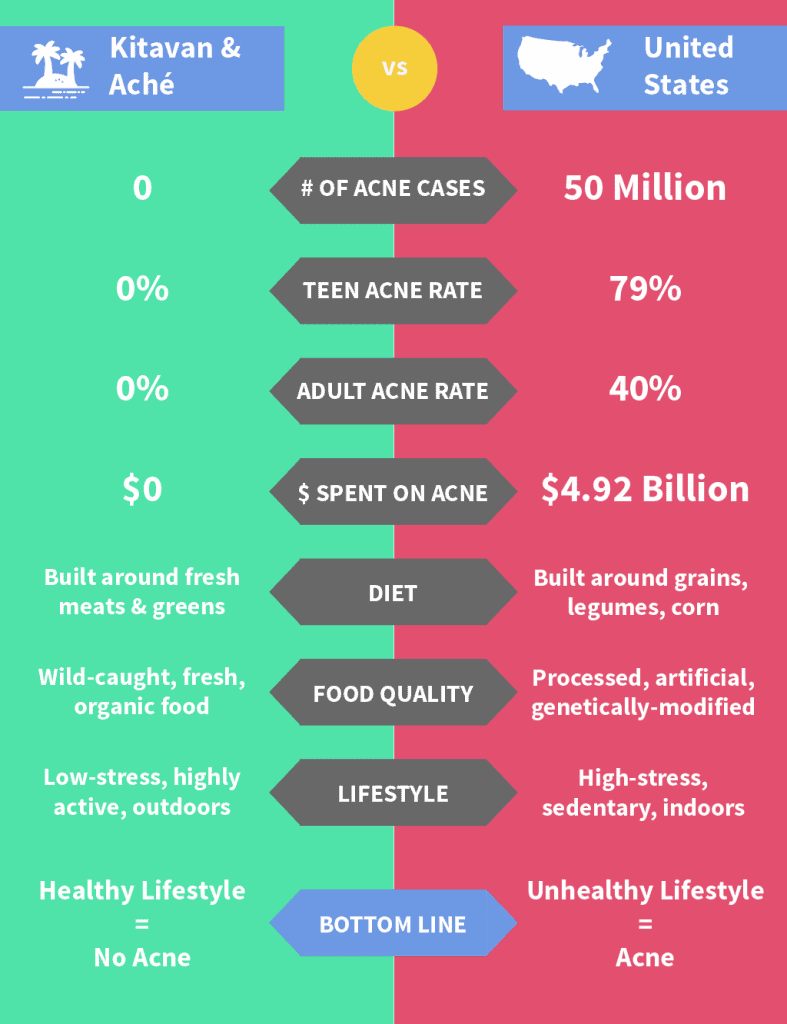
In westernized countries (the US, UK, Australia, etc.) upwards of 95% of children and teens have acne. A shocking 54% of the adult population has acne.
If we take a look at some of the real root causes behind acne, including chronic inflammation, insulin resistance, and leaky gut syndrome, it becomes obvious why our western diets and lifestyles lead to acne:
- Upwards of half of Americans have insulin resistance, which means they produce a huge amount of the acne-causing hormone insulin
- The average American consumes 20 times more pro-inflammatory fats versus anti-inflammatory fats, which could be part of the reason 60 million Americans suffer from autoimmune conditions (including acne)
- Although declining, dairy consumption is still extremely high and factory-farmed beef, dairy, poultry, and seafood are the norm
Do you really think its a coincidence that our health is in decline, our diets are straying further and further from our evolutionary history, and rates of teen and adult acne are at all-time highs?
Acne is primarily a dietary disease.
Sure, your hygiene may have something to do with it (especially if you’re using harsh cleansers and creams that damage your skin), but how many times have you heard that not showering after a workout will make you break out?
Turns out that’s been completely debunked.
Do you really think our Paleolithic ancestors were washing their face with harsh cleansers and following up with irritating moisturizers?
The real root causes of acne
The largest causes of acne can be boiled down to the following 3 root causes:
- Hormones: insulin, IGF-1, IGFBP-3, IL-1 Alpha – can be triggered from eating too often, eating too many carbs, or eating dairy
- Gut issues: caused primarily by eating too often, food intolerances, and diets high in grains and legumes
- Chronic inflammation: an overactive immune system that’s the result of a diet high in omega-6 fatty acids or a damaged digestive system
While there are certainly other issues at play here, these are, at least based on the scientific research available to us right now, the main drivers of acne.
Hormones tell your body to produce way too much skin cells and sebum oil, which end up clogging and blocking pores. These pores become infected, and an unhealthy gut and chronic inflammation take this harmless little acne infection and turn it into a bright, red, protruding pimple in order to “protect” the body.
If you still don’t believe that diet influence acne, then do a little experiment: try cutting out dairy and grains for just one month, and see how your skin reacts.
Back to the topic at hand – the ketogenic diet can be effective at treating acne because it directly addresses two of the major root causes of acne: insulin (acne-causing hormone) and chronic inflammation.
It naturally lowers levels of insulin and has anti-inflammatory effects.
We’ll cover these benefits in more detail shortly, but for now, let’s take a step back and make sure we understand what the ketogenic diet is.
What is the ketogenic diet?
The ketogenic diet, or “keto”, for short, is a low-carbohydrate and high-fat diet.
This means that it’s basically the opposite of what most Westerners are used to eating.
The goal of a ketogenic diet is to burn fat for fuel.
Typically we burn carbohydrates as our primary energy source. By eating a ketogenic diet, we deprive our body of nutritional carbohydrates and force it to burn either our own fat or the fat found in food for fuel.
While in ketosis, the body produces ketones for energy, which is where the term “ketogenic diet”, or “keto”, comes from.
In order to make this happen, you need to make sure you’re consuming few enough carbs that your body has to rely on fat for fuel.
Who knew that eating fat could actually make you burn fat?
This is actually why people have such an easy time losing weight on keto.
We need to flip the food pyramid and cut back on carb-heavy foods like french fries, sweets, grains, starches, and even some fruits. Instead of these foods, ketoers rely on healthy fats and animal protein, including coconut oil, grass-fed butter, olive oil, beef, fish, poultry, etc.
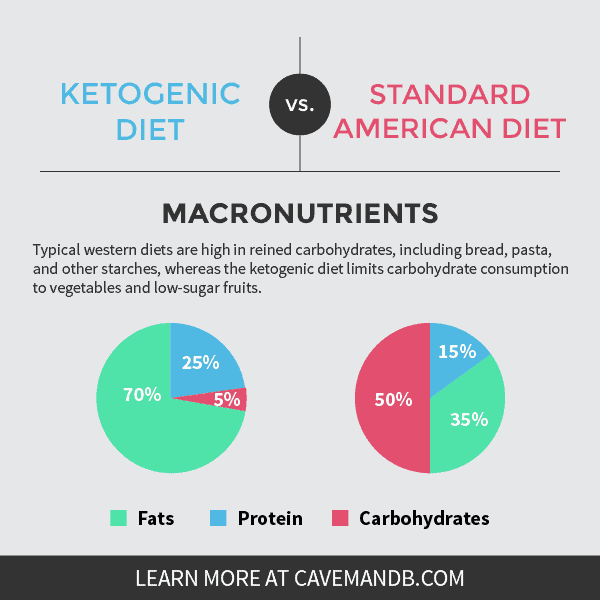
In a typical ketogenic diet, around 5% of total calories will come from carbs. For most people, this means less than 25g per day. Around 25% will come from protein, and the rest, an amazing 75% will come from fat.
Side-note: You do not need carbs to survive. I’m not going to go into detail in this post on why that’s the case, as other publications have already done a great job explaining why.
What a typically ketogenic diet looks like
Generally speaking, a typical ketogenic diet will consist of the following low-carb foods:
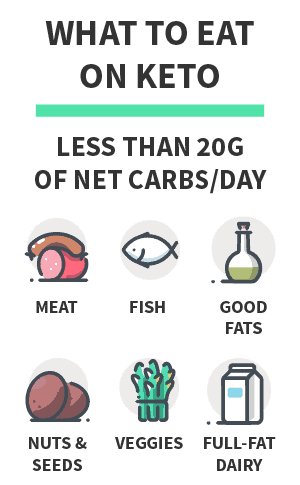
- Meat (and lots of it): Beef, lamb, pork, poultry, turkey, etc.
- Fish & seafood: Salmon, sardines, trout, shrimp, shellfish, oysters
- Eggs
- Whole-fat dairy
- Leafy vegetables: Spinach, romaine, broccoli, kale, cauliflower
- Healthy fats: Coconut oil, butter, olive oil
- Nuts: almonds, macadamia, pecans
While this is a pretty good start, some of these foods, like whole-fat dairy or even nuts, can cause a lot of problems for people with acne.
For this reason, I’ll go over some simple modifications to make to the ketogenic diet in order to make it a little bit more effective for those with acne-prone skin.
For more details read this guide on Keto diets for acne.
On the flip side, there’s a lot of foods you simply can’t eat on the ketogenic diet due to the number of carbs in them.
Many Paleo-friendly foods like sweet potatoes or fruit will throw you out of ketosis.
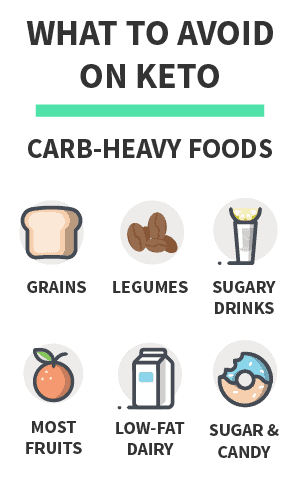
One sweet potato has 21g of net carbs. A single cup of white rice has 34g (and who has just one cup?). A banana has 24g. Remember: we are going for less than 20g of net carbs per day.
Most people going on keto eliminate the following foods due to their high carbohydrate content:
- Grains: Wheat, barley rye, corn, rice, quinoa
- Legumes: Beans, soy, lentils
- Most fruits: Apples, bananas, oranges, fruit juice
- Starchy vegetables: Potatoes, sweet potatoes, corn
- Sugars: Honey, syrup, high-fructose corn syrup
- Low-fat dairy: Skim milk, fat-free or low-fat yogurt
- Most Alcohol: Beer, sweet wines, mixers
- Non-diet Soda/Soft-Drinks
- Processed foods with hidden carbs
Why can Keto help acne?
Now that we know what the ketogenic diet is, it’s time to jump into how a ketogenic diet can help with acne.
Before we get too far in, I want to make something perfectly clear – the ketogenic diet isn’t a magic bullet to get rid of acne.
There are aspects of the ketogenic diet that actually might make some people’s acne worse due to genetics, stress levels, or their medical history.
With that being said, the ketogenic diet is a great choice when compared to most other diets.
I compared keto to Paleo, Vegan, and the Whole30 Diet here if you’re interested.
So why exactly does keto generally make your skin healthier?
Keto lowers levels of acne-causing hormones
Bare with me here for a second, as this is probably the single largest benefit of keto for acne.
Insulin is the most important hormone when it comes to acne.
Insulin isn’t all bad – it’s a neccessary hormone that helps turn carbohydrates found in food into usable energy for the body.
Unfortunately, it’s also involved in just about every step of the acne-formation process:
- It signals to the body to produce too many skin cells, which ends up clogging pores
- Insulin tells the sebaceous gland to produce too much skin oil, which also clogs pores
- It triggers inflammation, which turns a harmless acne infection into a bright, red, angry pimple
- It can increase levels of IGF-1, an acne-causing hormone found in dairy
Producing too much insulin typically isn’t a problem for healthy individuals, however, in the carb-binging world that we live in, chronically high levels of insulin affect upwards of half the population.
Why? There are two main factors at play here:
- The average American consumes upwards of 3 times (350g+) the number of carbs we realistically burn each day
- On average, we spend only 2 hours a week being physically active
We’re eating tons of carbs, but not using that energy for anything. This leads to a nasty cycle called insulin resistance, where every time you eat carbs your body releases more and more insulin.
In a nutshell, you can think of insulin resistance like packing a suitcase. At first, it’s really easy to put a ton of clothes in there, but as it gets more and more full, you’ve gotta push and pull harder and harder to fit anything in there. Pretty soon the bag is overflowing, and you’re jumping up and down trying to get it to close shut.
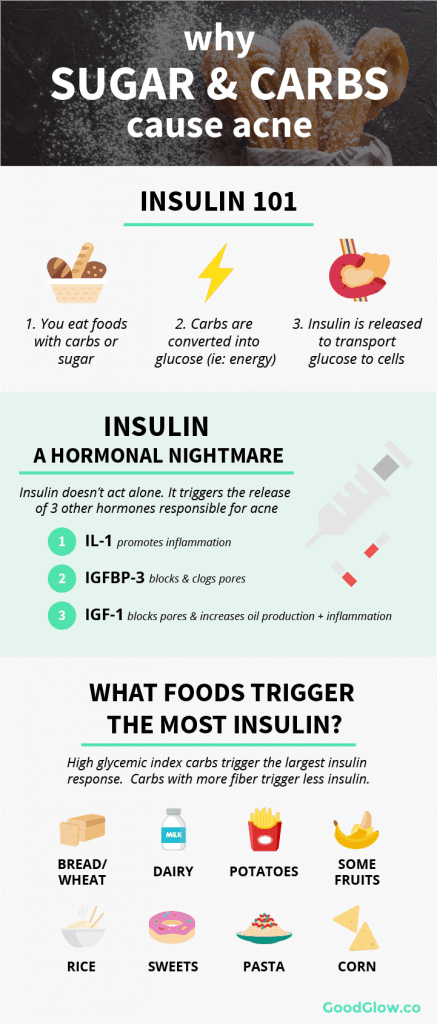
You end up eating carbs that your body should use for energy but doesn’t. Your muscles are full of glycogen already, but you keep eating more carbs. So, what does your body do? It releases even more insulin. Rinse, wash, and repeat.
Not only is insulin a nightmare for acne, but it also increases levels of the acne-causing hormone IGF-1. IGF-1 can also be found in dairy, which is why I generally recommend avoiding it.
So if carbs trigger the release of insulin, then the ketogenic diet, which almost entirely eliminates carbs, should be great for minimizing insulin, right?
Exactly.
One comprehensive study on the effects of the ketogenic diet found that insulin resistance dropped by upwards of 75% after just two weeks of eating a low-carb diet.
The two most powerful tools when it comes to tackling insulin-driven acne is to cut back on carbs and experiment with intermittent fasting. Better yet? Try them both at the same time, they really go hand and hand. I wrote an entire guide to intermittent fasting and acne here if you’re interested.
Keto reduces inflammation
Remember how I said most Americans have chronically high levels of insulin, one of the most powerful hormones behind acne?
Well, it turns out that many Americans may have chronic inflammation too.
Inflammation is your body’s natural, healthy response to threats like infection or injury.
When something harms the body, your immune system fires off an inflammatory response. Swelling and redness occur, and the body begins to heal and protect.
Just like insulin, this process should go on without a hitch, but in most people with acne (who have chronic inflammation), this isn’t the case.
The skin is a wild jungle full of good and bad bacteria. Infections take place all the time, and most of them, including acne infections, are pretty harmless. Unfortunately, when your immune system is always on high alert due to chronic inflammation, it treats that tiny little acne infection like a major threat.
What comes next?
A protruding, swelled, red inflammatory response.
Sound familiar?
It should, this is how most pimples are formed.
Several studies have found that a low-carb diet contributes to lower levels of inflammation.
Furthermore, studies have also found that sugar, something you naturally won’t be consuming much of on keto, is linked to low-grade chronic inflammation.
Some of the most common inflammation-causing foods are grains. The reason for this is that they can actually cause something called leaky gut syndrome, where undigested protein can “punch holes” and enter the bloodstream from the intestine.
By going low-carb, you’re naturally limiting your grain and starch intake, which can also help with this.
Overall, the low-inflammatory nature of keto is a huge part of the reason it works so well for people struggling with acne.
Drawbacks of keto for acne
While the ketogenic diet tackles two of the largest root causes of acne (chronically high levels of insulin and inflammation), that doesn’t mean it’s bulletproof.
There are some aspects of a ketogenic diet, especially a “dirty” keto diet, that may cause acne.
High intake of dairy can trigger acne
If you’ve been researching the link between diet and acne for a while now, I’m sure you’ve heard plenty of people say that cutting out dairy is essential.
There are a few reasons for this:
- Dairy is high in acne-causing hormones IGF-1 and insulin
- On top of the insulin found in dairy, it also triggers a huge insulin response from your body
- Dairy protein (casein) can damage the gut and make digestion difficult
- Sensitivity to lactose, casein, and whey (dairy protein) are extremely common, affecting upwards of half the world population
See my Full Guide to Dairy and Acne for more information.
When people switch over to a ketogenic diet, they often start consuming a lot more dairy because it’s naturally low in carbs and high in fat and protein.
Unfortunately, this can mean a host of problems for people with acne-prone skin, and it may negate the other benefits of keto (like lower insulin levels).
I’ll go over the specifics shortly, but the only dairy I recommend acne-prone individuals eat is grass-fed ghee.
Low-quality meat and fats can cause inflammation
Remember that whole spiel about chronic inflammation?
Well, low-quality fats and meat can actually cause chronic inflammation if you’re not careful.
There are two main fatty acids that affect the body’s inflammatory response:
- Omega-3 fatty acids – anti-inflammatory (good for acne), found in fish
- Omega-6 fatty acids – pro-inflammatory (bad for acne), found in vegetable oils, low-quality meats, artificial foods
While eliminating sugar-filled junk foods is a good place to start when it comes to cutting back on omega-6s, many keto-friendly foods are loaded with omega-6:
- Many nuts – almonds, pecans, tree nuts, etc.
- Vegetable oils – soybean, corn, canola, sesame oil
- Farmed-fish and conventional meat – Beef, chicken, pork, etc.
This means that even though a low-carb diet naturally limits inflammation if you’re eating tons of salad dressings or vegetable oils, you could still be triggering inflammation.
For this very reason, it’s essential to do two things:
- Stick to healthy fats like olive oil, coconut oil, avocado oil, beef tallow, and grass-fed ghee
- Get the highest quality meat and seafood you can. Grass-fed beef has 3 times less omega-6 than grain fed, and wild-caught salmon has 6 times less omega-6 than farmed salmon
Nuts can cause acne for some people
There are two main problems when it comes to nuts and acne:
- Many people are sensetive, intolerant, or allergic to nuts
- Many nuts are high in omega-6 fatty acids
Both can trigger chronic inflammation and cause acne.
Nuts also have a lot of benefits for acne-prone skin too:
- Almonds and hazelnuts are high in skin-protecting antioxidants
- Almonds have pre and probiotics that can improve gut health
- Brazil nuts are loaded with selenium
Furthermore, most nuts are a great carb-conscious snack choice. Instead of triggering a bunch of insulin (and acne) by chomping down on potato chips or cookies loaded with carbs, nuts are a much better option.
The key with nuts is to really, limit your consumption of them and treat them like a snack, not a meal.
Changing your diet can cause stress
You don’t need me to tell you that stress causes acne.
If you’ve ever been late for work, up late studying for finals, or having relationship problems, you know what a “stress pimple” is.
When you’re stressed your body releases a hormone known as cortisol. It’s your body’s natural fight-or-flight hormone.
The science behind cortisol and acne is pretty simple:
- Cortisol increases the release of insulin (a root cause of acne)
- It can trigger inflammation (a root cause of acne)
- Stress weakens the digestive system (a root cause of acne)
- Worse sleep (yep, another cause of acne)
Putting your body through any dietary change is going to be stressful, both psychologically and physically.
This may contribute to acne at the beginning of your keto journey.
What the research says
Because the link between acne and diet has been neglected for so long, we really only have a few major studies to go off of when it comes to lower-carbohydrate diets and acne.
Research published in The American Journal of Clinical Nutrition outlines the following experiment:
43 male patients between 18 and 25 years old were placed on one of two diets:
- One lower-carb group with 25% of energy coming from protein, 45% coming from low glycemic index carbs, and the remaining 30% from fat
- One higher-carb group that emphasized high glycemic index carbs without putting a specific cap on it
At the end of 12 weeks, the size and amount of acne lesions were measured.
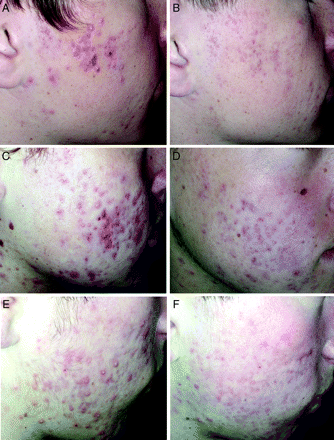
The results were amazing, especially compared to the high glycemic index carb group.
Total lesion count (pimples or comedones) decreased by 24% for the low-carb group vs. 12% for the high-carb group. The low-carb group experienced twice the decrease in pimples compared to the high-carb group.
The study found that insulin resistance (a bad thing) decreased significantly more for the low-carb group than it did for the high-carb group.
Bare in mind, the lower-carb group still isn’t a ketogenic diet. The insulin-blunting affects of a ketogenic diet would likely be even more profound if the carbohydrates each group consumed was limited to 5% of total calories.
Concentrations of IGF-1 and levels of insulin resistance were significantly lower for the low-GI group, alluding to the fact that a low carb diet may be a huge win for people with diet-driven acne.
There’s still a lot of research to do before we can jump to any conclusions related to diet and acne, but the preliminary results are pretty convincing that at the very least there is a strong chance that lower-carb diets are more beneficial for acne.
How to modify the ketogenic diet for acne-prone skin
So you want to experiment with a low-carb diet for acne?
Great!
A low-carb, ketogenic diet by itself is a great place to start.
With that being said, there may be some problems with a ketogenic diet that’s high in unhealthy fats or meat.
For starters, I recommend downloading the free GoodGlow Diet Blueprint and doing two things with it:
- Stick to “Safe” foods whenever possible
- Track your carb intake with something like Cronometer for a few days or weeks and stick to less than 25g of net carbs per day
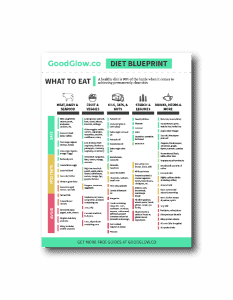
The diet blueprint will help you stick to 4 key principles for making the ketogenic diet ideal for acne-prone skin:
- Avoid vegetable oils (canola, corn, soybean, sunflower, safflower, etc.) and stick to consuming healthy fats: olive oil, coconut oil, avocado oil, beef tallow, and grass-fed ghee
- Avoid all dairy except for grass-fed ghee and maybe grass-fed butter
- Get the highest quality meat you can – grass-fed beef, pasture-raised chicken and pork, wild-caught seafood
- Don’t eat too many nuts – treat them like a snack, and stick to nuts low in omega-6, like macadamias, hazelnuts, or almonds
Lastly, I always recommend that people struggling with acne consider adding intermittent fasting to their arsenal if they’re still struggling with acne after going low-carb.
In addition to amplifying the beneficial effects of keto, including increased insulin sensitivity and decreased inflammation, intermittent fasting can give you better sleep, increased oxidative stress resistance, and this cool process called autophagy where old, potentially toxic cells are recycled and used for energy.
Check out my Ultimate Guide to Intermittent Fasting for Acne for more information.
Lastly, give it time. You won’t see results right away, in fact, it’ll likely take a few months. I saw results from keto within a few weeks, but it took a long time to really see results.
You need to ask yourself this – Do you want to truly fix the underlying health issues that cause acne, or do you want to keep treating the symptoms of acne.
Putting it all together
On a personal note, I’ll just say this – cutting back on carbs has been a huge tool in improving my skin. Between keto and intermittent fasting, it’s hard to say which has been more valuable.
The good news is, when you start burning fat for fuel, it becomes a lot easier to fast for prolonged periods of time, which can result in a wide array of benefits for your skin.
The ketogenic diet isn’t the only diet that can work for acne. It’s also not a guarantee that keto will work for you.
In fact, a “dirty” keto diet with tons of low-quality meats, vegetable oils, and dairy might actually make acne worse.
With all that being said, I think that the ketogenic diet, especially when combined with the GoodGlow Diet Blueprint is an excellent place to start.
Have you tried keto for acne? Do you have any questions about how to best use keto for acne? Let me know in the comments below, and as always, keep experimenting – the journey towards clear skin from within isn’t easy, but I guarantee you it will be worth it.

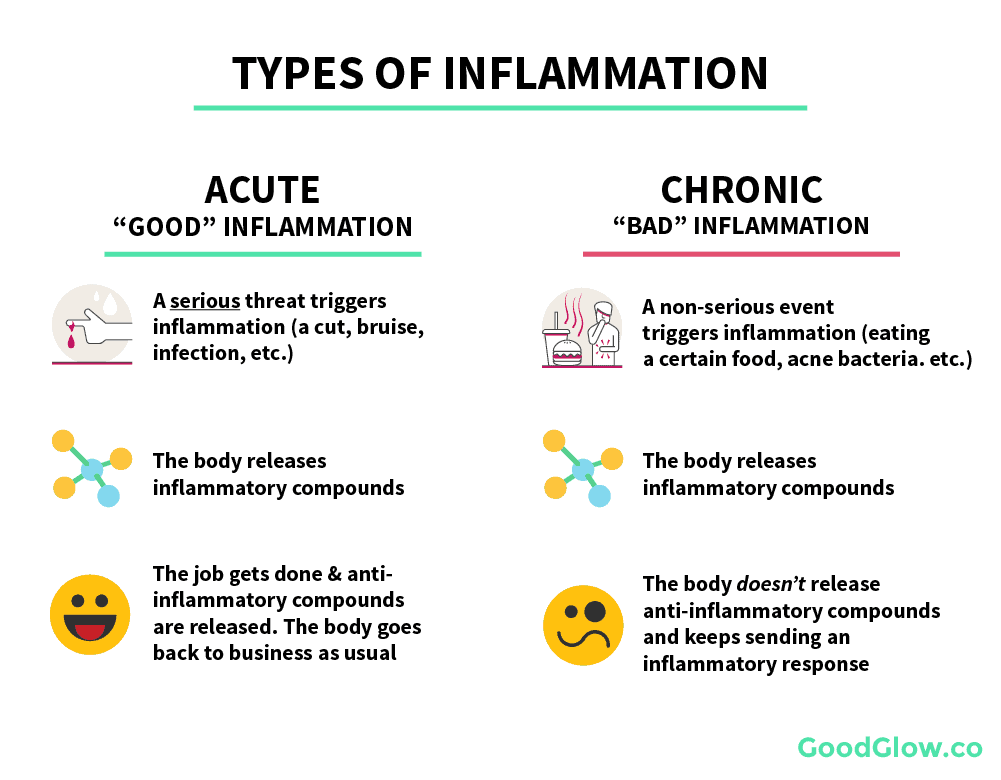
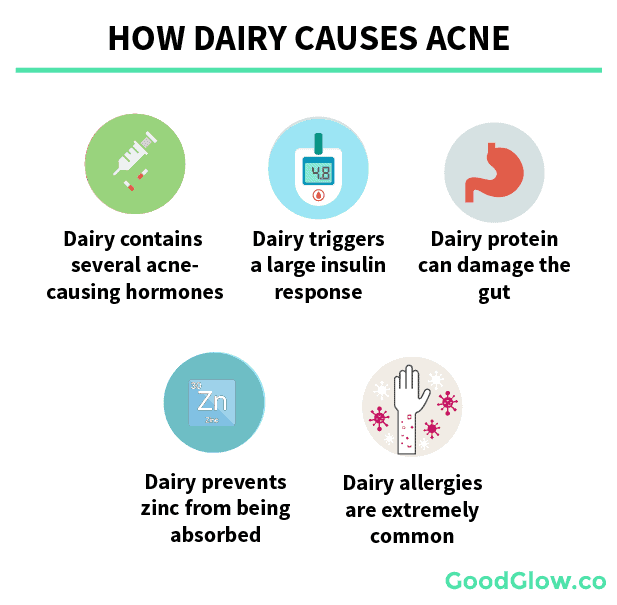
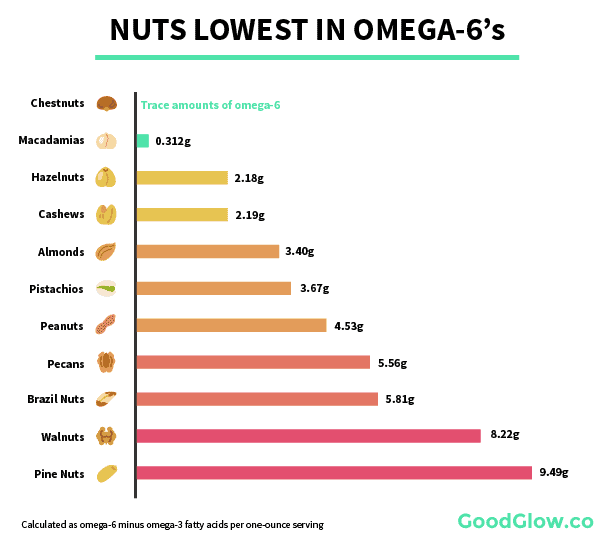
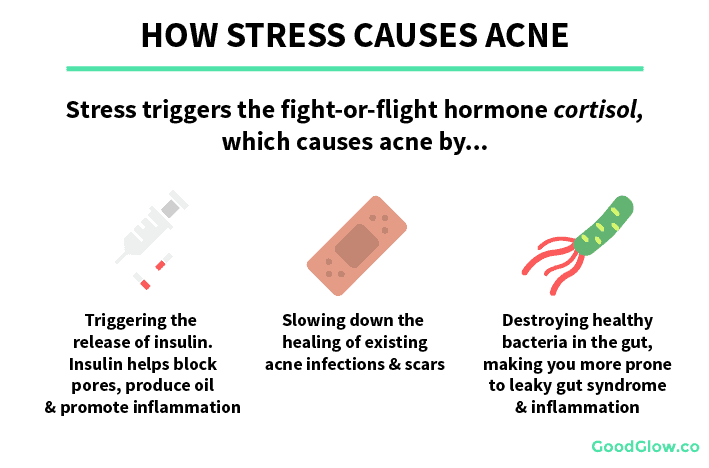

It’s really great that keto may cure or treat acne!